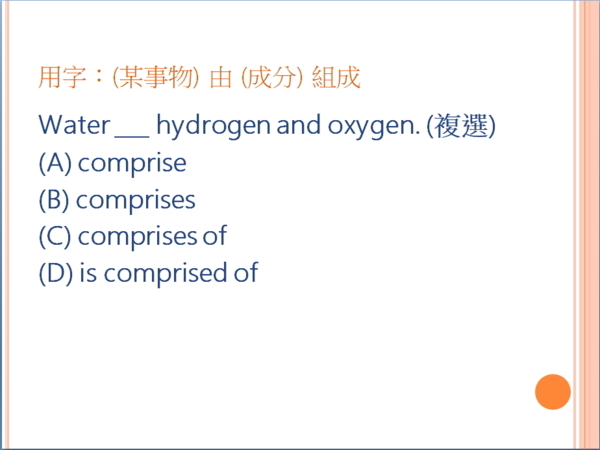

 字體:小 中 大
字體:小 中 大 |
|
|
|
| 2019/01/03 02:38:48瀏覽3333|回應0|推薦0 | |
Q. 2017/11/28 老師好,想跟老師討論一下今天寫作課的問題:水是由氫氣、氧氣組成。我後來在火車上想了一下,還是覺得comprise可以用被動耶@@ 以下是我找的資料:
牛津字典寫: The committee is comprised of representatives from both the public and private sectors.
朗文字典也說: On the other hand, the brain is comprised of ten billion or so neurons.
所以是不是以comprise這個字來說的話,【大單位由小單位組成】可以用主動、被動都可以呢?
抑或是【被動的用法】其實是大家誤用而【積非成是】了呢? 想聽老師的見解謝謝老師^ ^
A. 關於 comprise 的用法,如果從常見到不常見的順序排列,大致上是: 1. [整體 + comprise + 組件]:The country comprises twenty states. 2. [整體 + be comprised of + 組件]:The country is comprised of twenty states. 3. [組件+ comprise + 整體]:Twenty states comprise the country. !錯誤用法 [整體 + comprise of + 組件]:The country comprises of twenty states. (X)
字典那兩句都是用法 2,當然沒問題。至於字彙的那道練習題「Water ___ hydrogen and oxygen.」也如此: Water is comprised of hydrogen and oxygen. Water comprises hydrogen and oxygen.
有些動詞,主動或被動的型態,意義沒有太大差別,因為被動分詞被當作形容詞看待囉: I won’t finish the report for another hour. I won’t be finished with the report for another hour.
She is facing a difficult decision. She is faced with a difficult decision.
They oppose the cloning of human cells. They are opposed to the cloning of human cells.
|
|
| ( 知識學習|語言 ) |









